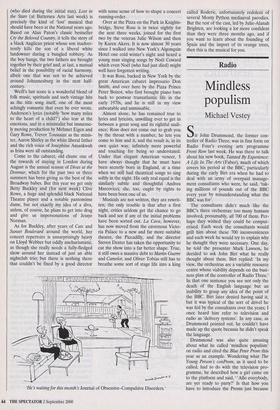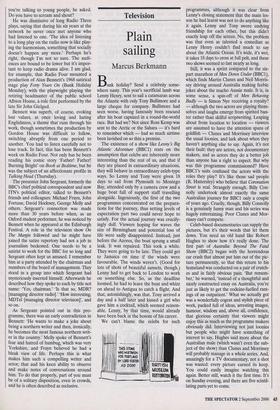Radio
Mindless populism
Michael Vestey
Sit John Drummond, the former con- troller of Radio Three, was in fine form on Radio Four's evening arts programme Front Row last week. He was there to talk about his new book, Tainted By Experience: A Life In The Arts (Faber), much of which covers his period at the BBC, particularly during the early Birt era when he had to deal with an army of overpaid manage- ment consultants who were, he said, 'tak- ing millions of pounds out of the BBC every year by misunderstanding what the BBC was for'.
The consultants didn't much like the BBC's three orchestras: too many humans involved, presumably, all 700 of them. Per- haps they wished they could be comput- erised. Each week the consultants would grill him about these 700 inconveniences and each week he would try to explain why he thought they were necessary. One day, he told the presenter Mark Lawson, he decided to ask John Birt what he really thought about them. Birt replied: 'In my view, the orchestras are a variable resource centre whose viability depends on the busi- ness plan of the controller of Radio Three.' In that one sentence you see not only the death of the English language but an inability to grasp any idea of the point of the BBC. Birt later denied having said it, but it was typical of the sort of drivel he was fed by the consultants over the years; I once heard him refer to television and radio as 'delivery systems'. In any case, as Drummond pointed out, he couldn't have made up the quote because he didn't speak the language.
Drummond was also quite amusing about what he called 'mindless populism' on radio and cited the Blue Peter Prom this year as an example. Wondering what The Young Person's conProm, as it used to be called, had to do with the television pro- gramme, he described how a girl came on to the platform and said, "Alio everybody, are yer ready to party?' Is that how you have to introduce the Proms just because you're talking to young people, he asked. Do you have to scream and shout?
He was dismissive of long Radio Three plays, saying that during his six years at the network he never once met anyone who had listened to one. 'The idea of listening to a long play on the radio now is like play- ing the harmonium, something that socially doesn't happen any more.' Perhaps he's right, though I'm not so sure. The audi- ences are bound to be lower but it's impor- tant to keep radio drama alive. I am glad, for example, that Radio Four mounted a production of Alan Bennett's 1968 satirical stage play Forty Years On (Bank Holiday Monday), with the playwright playing the retiring headmaster of the public school Albion House, a role first performed by the late Sir John Gielgud.
Bennett was superb, of course, evoking lost values, at once loving and hating Englishness, a theme that runs through his work, though sometimes the production by Gordon House was difficult to follow, switching abruptly from one period to another. You had to listen carefully not to lose track. In fact, this has been Bennett's week on Radio Four. Not only has he been reading his comic story 'Father! Father! Burning Bright' on Book at Bedtime, but he was the subject of an affectionate profile in Talking Head (Thursday).
The presenter John Sergeant, formerly the BBC's chief political correspondent and now ITN's political editor, talked to Bennett's friends and colleagues: Michael Frayn, John Fortune, David Hockney, George Melly and others. Sergeant's connection was made more than 30 years before when, as an Oxford student performer, he was noticed by Bennett when he appeared at the Edinburgh Festival. A role in the television show On The Margin followed and he might have joined the satire repertory had not a job in journalism beckoned. One needs to be a satirist to work for the BBC for so long and Sergeant often kept us amused. I remember him at a party attended by the chairman and members of the board of management. They stood in a group into which Sergeant had mysteriously inserted himself. Afterwards he described how they spoke to each by title not name: 'Yes, chairman.' Is that so, MDR? [managing director radio].' How interesting, MDTe1 [managing director television'', and so on.
As Sergeant pointed out in this pro- gramme, there was an early contradiction in Bennett: 'He wants to make a joke about being a northern writer and then, ironically, he becomes the most famous northern writ- er in the country.' Melly spoke of Bennett's fear and hatred of humbug, which was very Yorkshire, and Frayn believed he had a bleak view of life. Perhaps this is what makes him such a compelling writer and actor; that and his keen ability to observe and make notes of conversations around him. To do that properly, part of you must be of a solitary disposition, even in crowds, and he is often described as reclusive.



























































 Previous page
Previous page